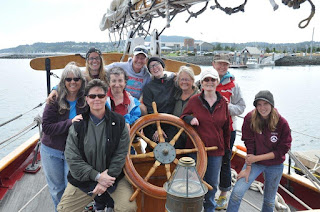 |
| Chief Mate Nate Seward talks with Port of Seattle intern Pedro Reynaga (at the wheel) during the Adventures at Sea program, sponsored by the Port of Seattle aboard Adventuress Sept. 15-17. |
This summer, Sound Experience added a new kind of program to Adventuress's schedule: Adventures at Sea, aimed at providing young adults with hands-on education in maritime trades.
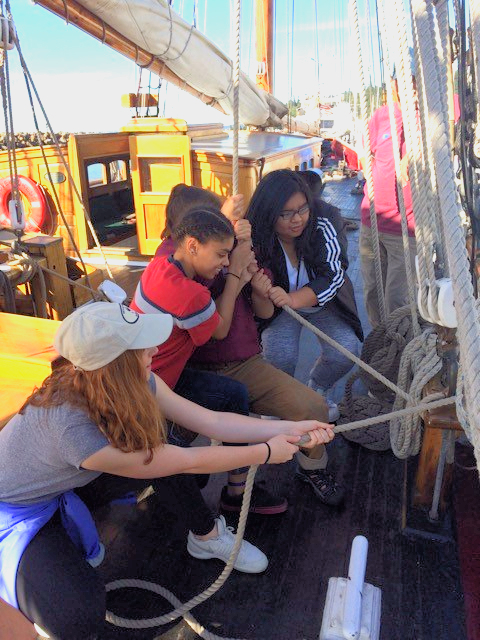 |
| Learning to "sweat and tail" on the starboard mainsail lift September 15 are (from left) Annie Means, Charlie Cox, Julia Kosowsky (obscured) and Jessica Apilado. |
On September 15, eight young Port of Seattle interns boarded our beloved historic schooner at Shilshole Bay Marina for a weekend of hands-on training.
Living aboard Adventuress for three days is a powerful experience in many ways. Anchoring at night in Blakely Harbor and Port Madison, standing night watch and doing morning chores together -- it adds up to communuty. (Of course, chores on Adventuress aren't chores; they're called "Boat Love.")
Sharing meals, laughs and quiet time, and hauling on lines together also support the sense of the connection between one another and the environment that grows from being aboard, conserving resources, observing wildlife and spending time outdoors on the water.
For this weekend with the Port of Seattle interns, the crew shifted focus a bit to emphasize maritime skills acquisition.
Adventuress is a great place to learn maritime skills that apply to ships of all sizes -- like handling lines under strain, which happens when you're raising the second-largest sail on the West Coast. Navigation, line handling, and climbing aloft safely are all skills that require a level of situational awareness that's nearly impossible to learn from a book or a screen.
Living aboard Adventuress for three days is a powerful experience in many ways. Anchoring at night in Blakely Harbor and Port Madison, standing night watch and doing morning chores together -- it adds up to communuty. (Of course, chores on Adventuress aren't chores; they're called "Boat Love.")
Sharing meals, laughs and quiet time, and hauling on lines together also support the sense of the connection between one another and the environment that grows from being aboard, conserving resources, observing wildlife and spending time outdoors on the water.
For this weekend with the Port of Seattle interns, the crew shifted focus a bit to emphasize maritime skills acquisition.
Adventuress is a great place to learn maritime skills that apply to ships of all sizes -- like handling lines under strain, which happens when you're raising the second-largest sail on the West Coast. Navigation, line handling, and climbing aloft safely are all skills that require a level of situational awareness that's nearly impossible to learn from a book or a screen.
The Port of Seattle financed the three-day trip for the interns, who hailed from all around the region, and had been working at internships ranging from aerospace to environmental contracts, from human resources, IT and communications to accounting and asset management. All were amazing young people with exceptional motivation to learn as much as they could. And they were fun to have around -- Pedro was good-humored about the teasing he got for admitting he hadn't noticed the part in the paperwork about the vegetarian food (which he ended up really liking). And there were always jokes from Jessica, who yelled from the bowsprit netting to her shipmates learning to row the small boat, to please bring back some food from Ezell's, a fried chicken place near her Beacon Hill home. Also, Sabirin's full renditions of "Party in the USA" really livened up the ship during "Boat Love."
A few were headed into aerospace careers, but Jessica already knew she wanted to "work in maritime." But she also admitted that her family is resistant to her ideas about working in the maritime industry. "My whole family doesn't like boats. Even though we're Filipino, we just don't."
Maybe her family doesn't, but Jessica certainly likes boats.In spite of frequent muttering and complaint-like joking, Jessica was obviously instantly at home with the rhythms and work of shipboard life. She mutters, but really she likes working hard, she said, talking about her aspirations.
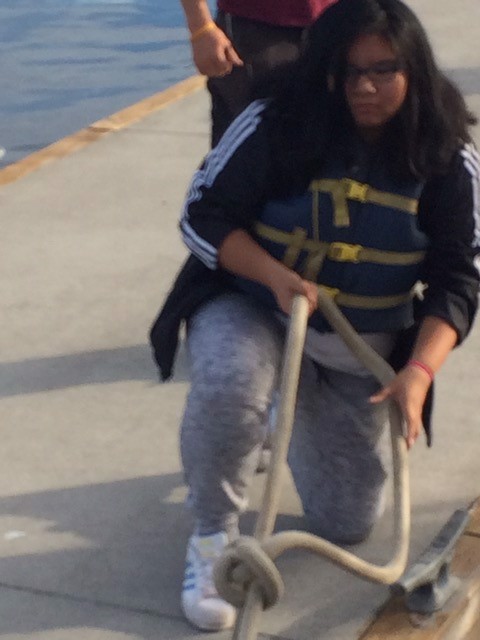 |
| Jessica Apilado handles an Adventuress dockline at Shilshole Bay Marina Sept. 15 |
Her familiy thinks maritime work isn't safe, she said; they expect her to go into nursing. "The stereotypical Filipino nurse, you know?" She's personally not at all enthusastic about the prospect, she said, while standing at Adventuress's bow while we sailed in Elliott Bay, looking toward the cranes of the Duwamish.
Her Port of Seattle internship was at the Pier 69 office complex, in engineering administration; she took care of their money, she said. Mostly she learned how to use SharePoint, an online collaboration system, and she made her share of silly memes, shared with Sabirin, Charlie and other Port interns there. Researching possible careers with NOAA and with shipping companies also occupies some of Jessica's time. She's not interested in engineering. "Too noisy and dusty," she said. "I don't want to be down there." Nor does she aspire to be captain. "I don't want to be the captain. I want to be the mate." She likes being on deck, and she threw the heaving line that helped land Adventuress's bow line, when the ship returned to Shilshole during that Sunday's hard rain.
Her Port of Seattle internship was at the Pier 69 office complex, in engineering administration; she took care of their money, she said. Mostly she learned how to use SharePoint, an online collaboration system, and she made her share of silly memes, shared with Sabirin, Charlie and other Port interns there. Researching possible careers with NOAA and with shipping companies also occupies some of Jessica's time. She's not interested in engineering. "Too noisy and dusty," she said. "I don't want to be down there." Nor does she aspire to be captain. "I don't want to be the captain. I want to be the mate." She likes being on deck, and she threw the heaving line that helped land Adventuress's bow line, when the ship returned to Shilshole during that Sunday's hard rain.
What draws Jessica to this career? Not really the travel, she said. What she really likes is the "community of mariners" -- that people of all nationalities who work in this field can share an understanding of each other's shared experiences, even if they speak different languages.
Marsha Dickgeiser, who coordinates youth maritime programs for the Seattle Maritime Academy, said Jessica's situation is "a classic problem at Seattle Maritime. Families want their kids to go to college." Especially first-generation immigrant families, she said, only want college for their kids, and see college as the only sure path to financial success. "And they think that boats are unsafe."
In another area of the ship, Program Coordinator Julia led a lesson in the environmental-awareness education that Adventuress is more commonly known for.
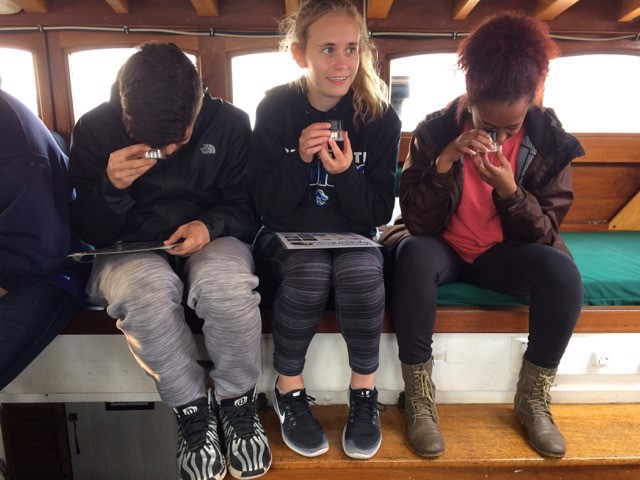 |
| Port of Seattle interns aboard for the Adventures at Sea program (from left) Pascal Nagata, Calei Kelly and Sabirin Abdi identify plankton with magnifying loups in Adventuress's deckhouse. |
"Take a deep breath, hold it in. Take another breath, hold it in," she says. "Say 'thank you, phytoplankton, for that second breath. Fifty percent of our oxygen comes from phytoplankton." She ties a long, narrow net to the ship, and has an intern throw it over, let it drag awhile, haul it back in, unscrew the special cup from the bottom and pour the mucky green-brown collected plankton into a jar for a closer look with magnifying loups.
Perhaps the greatest lessons learned while sailing Adventuress, however, are more personal. Climbing aloft requires most people to leave their comfort zones, to challenge themselves. Even more important is learning to support one's shipmates, to recognize that challenge looks very different to different people.
For example, women are often more intimidated by engineering. A ship like Adventuress, with its focus on inclusivity and its crew of professional educators, is a great place to feel more at home with such things, also because the ship's systems are so straightforward. The engine, generator and galley stove all run on diesel; there are tanks for fresh water, graywater and sewage; there's a windlass, powered by the main engine, that hauls up the anchor; there's a salt-water pump for washing down the decks.
Learning how these systems work is another reason Adventuress is so great for students pursuing maritime skills and technical-education credits. Skills like tying a fender on with a round turn and two half-hitches, making a stopper knot, highwayman's hitch, bowline, square or figure-eight knot, or safely handling a dock line or successfully throwing a heaving line, are the same skills used on much larger vessels. And they're handy around the house and garden, too.
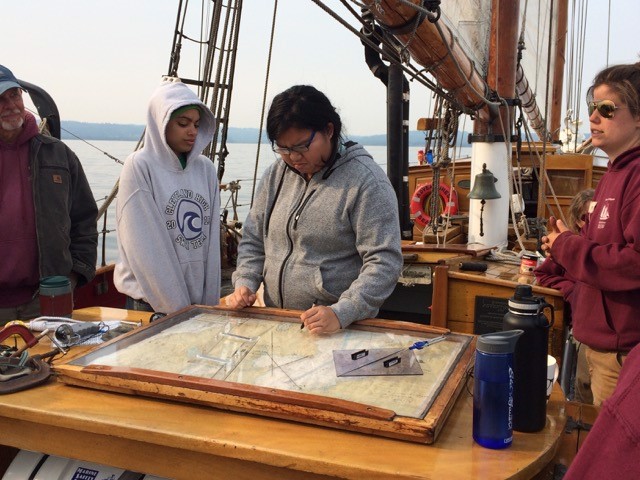 |
| Trainees Charlie Cox and Jessica Apilado plot Adventuress's position on a chart. Crewmembers Dan Adams (left) and Julia Kosowsky (right) deliberately stand back and let the trainees solve problems on their own. |
Spending the night aboard Adventuress anchored in a remote bay also means getting up to stand anchor watch for an hour, making sure everything is safe while your shipmates sleep. Using the compass to note the relative position of landmarks, plotting the ship's position on a chart, checking the level of water in the bilge and noting the wind and weather -- mariners have always done so, just as they've always been cheered by the sight of porpoises, and relished the surge of wind-powered motion when the breeze is brisk for sailing.
Hopefully, more students will sail aboard Adventuress for a few days of skills training, and we can help ensure the world has enough sailors, boatbuilders and engineers to help us all stay safe sailing into the future. The breezes are looking pretty brisk.
Hopefully, more students will sail aboard Adventuress for a few days of skills training, and we can help ensure the world has enough sailors, boatbuilders and engineers to help us all stay safe sailing into the future. The breezes are looking pretty brisk.









